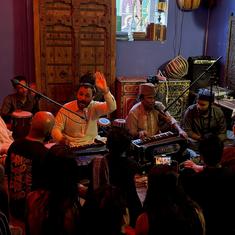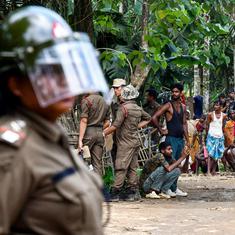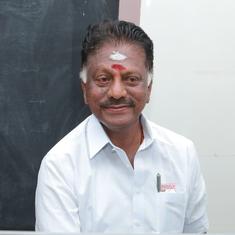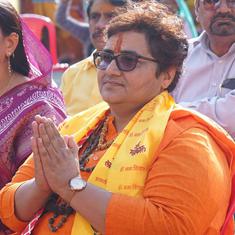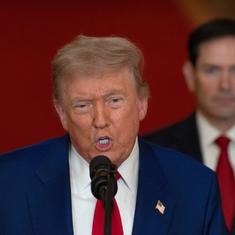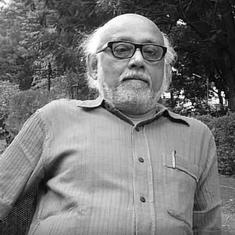"Our own people were murdered, the attack was not on a particular community but on the entire nation," Modi said on Friday. "It was like a dagger pierced through India's chest… It is unfortunate that on the birth anniversary of the man who dedicated his life in uniting the country, a tragic incident took place 30 years ago that shook the country and left it deeply scarred."
No matter how successful Modi is as prime minister, and one wishes him all the success, there is no doubt that at the centre of his legacy will be his inability to halt the Gujarat 2002 pogrom against Muslims. A dagger pierced through India’s heart again that year, and the best that Modi could say by way of regret about that incident was that even if a puppy came under a car, one felt bad about it.
There was a time when Indira Gandhi was far more powerful than Modi is today. She even suspended the Constitution at one point, becoming a de facto and de jure dictator for 21 months. Yet if history can be brutal to Indira Gandhi, it will also be brutal to Narendra Modi.
Just as Modi has not been found guilty of any wrongdoing in 2002, Rajiv Gandhi or any senior Congress leader has not been convicted for the sins of 1984. When they attempted to defend him during the campaign, Modi's supporters often pointed to 1984. The argument was that if Rajiv Gandhi could be prime minister despite the pogrom against the Sikhs, why couldn't Modi be prime minister?
Justice for 1984?
Well, Modi is now prime minister after a massive election campaign that won his party a simple majority in the Lok Sabha. The last time a party won a simple majority was the Congress in that election in the aftermath of the 1984 anti-Sikh pogrom. In the election campaign in October last year, Modi had said, "The Congress leader [Rahul Gandhi] says that some people [the BJP] are spreading hatred. He also says that he gets angry when he sees some people provoking others. Congress leaders should explain the 'anger' which killed thousands of Sikhs in 1984. Has anyone been convicted for the Sikh genocide so far. He [Rahul] is crying for the assassination of his grandmother but has he shed tears for those killed in the 84 riots… [I] Want to ask shahzada [Rahul], did your party killed Sikhs in anger when your grandmother died?"
While Modi needs to answer the same question about 2002, he also needs to be asked why he hasn’t yet ordered a fresh trial in the 1984 cases. He needs to explain why the Gujarat government wants to spare Maya Kodnani of the death penalty, given that she was convicted of the Naroda Patiya massacre in 2002.
The Congress party isn't in power anymore, there's only so much you can blame it. The onus for justice for all victims of the past, the Muslims of Gujarat and the Sikhs of Delhi, is now on Modi.
Compensation is not justice
The Narendra Modi government on Friday announced compensation of Rs 5 lakhs for the families of each person who died in the 1984 pogrom, in addition to the Rs 3.5 lakhs that had been given to them by the government of Prime Minister Manmohan Singh, a Sikh.
Most victims of Gujarat 2002 did not get any compensation.
Some Sikh politicians want the compensation to be enhanced to Rs 20 lakh. If Narendra Modi wants to win the Sikh votes in the next Delhi elections, he needs to walk the talk and get Sikhs justice. And justice does not mean setting up another commission.
A commission headed Justice GT Nanavati did not result in justice for the 1984 Sikh riots victims. It was set up by the previous BJP government, headed by Atal Behari Vajpayee. Over six years in power, the Vajpayee government could not get justice for the 1984 victims. It could not even sack Narendra Modi for the 2002 violence in his state.
This time round, will Narendra Modi bring to justice the perpetrators of 2002? That is highly unlikely. In the same Trilokpuri in East Delhi where Sikhs were killed in 1984, communal riots are being used to prepare for another election. A local BJP politician, Sunil Vaid, is under the scanner for his role in this violence. Riot after election after riot after election has been India’s story since before Independence. The Modi era only does it more efficiently.
Narendra Modi did not visit Indira Gandhi’s samadhi on her death anniversary to pay his respects, nor did he visit Nehru’s on his death anniversary. As he goes around re-arranging the pyramid of importance of India’s past leaders, he should place Rajiv Gandhi on the top and pay him special homage. He owes him the most. For had it not been for 1984, the events of 2002 would have been far less acceptable.



